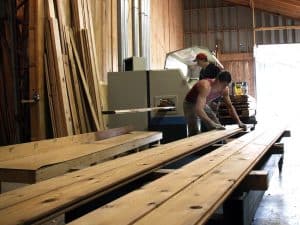
How can lumber mill jobs be more meaningful? Can automation remove some of the worst parts of the manual labor, leaving a job with worth?
“How do I attract good employees for low-level jobs?” That was one of the responses to our Survey of Rural Challenges.
You don’t. That would be my answer. You will have to re-imagine and remake those jobs.
Let’s look at a lumber mill, a real one in a real small town that friends from Oregon told me about. It has a reputation of churning through people. No one wants to stand on their feet for an 8 hour shift of meaningless work in a noisy and unpleasant environment. People don’t even last a full day; many quit after their first break on the first day. This leads to comments about “kids these days” being weak, and not able to tough it out.
The same family that owns that old mill also just built a new mill in a nearby small town. It will turn out just as much production, more or less, of an innovative new product. But it’s nearly all automated. Instead of 450 jobs, this mill will have 50. And instead of all being those meaningless, noisy, unpleasant and tough jobs, most of the 50 will be clean, more comfortable and at a higher level of responsibility for production.
It’s not just mills. It’s every job. All jobs, all work is being automated at a fast pace.
Millennials have gotten the reputation of refusing meaningless, soul-sucking work. They’re breaking our old mindless system that ground people down. And with automation also coming at us fast, they’re not a minute too soon.
Rather than trying to attract good employees for low level jobs, break those low level jobs apart. Automate the crappy parts. Figure out how to make the important stuff also interesting and useful.
New to SmallBizSurvival.com? Take the Guided Tour. Like what you see? Get our updates.
- About the Author
- Latest by this Author
Becky started Small Biz Survival in 2006 to share rural business and community building stories and ideas with other small town business people. She and her husband have a small cattle ranch and are lifelong entrepreneurs. Becky is an international speaker on small business and rural topics.











[…] we talked about the difficulties in finding good people for low-level jobs in rural areas, I wanted to follow up with a challenge Mike shared with us: “Getting people to live here or […]